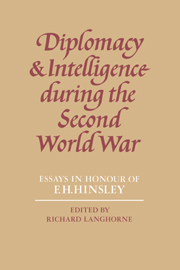Book contents
1 - Introduction
Published online by Cambridge University Press: 21 September 2009
Summary
Harry Hinsley is now the Master of St John's College, Cambridge, and in 1981–3 was Vice-Chancellor of the University of Cambridge. The circumstances in which his journey to the Vice-Chancellorship began marked the second occasion in his career when electors preferred to make sure of having him rather than follow the dictates of established custom. He was the first Vice-Chancellor of Cambridge in modern times to have been nominated before having actually entered office as the Head of a College. His election into a Fellowship of St John's College was similarly unusual, since he was at the time a third year undergraduate and had taken no degree. This event, which took place in 1944, was at least partly the result of wartime conditions. He had come up to St John's in 1937 as an Exhibitioner – he became a Scholar in 1939 – from Queen Mary's Grammar School, Walsall. His background was a poor one and the school helped him financially by supplementing his Exhibition from the College. Even so, his circumstances as an undergraduate were extremely difficult. His success, however, was marked by a First Class in Part One of the Historical Tripos in 1938, and neither this, nor his habit of working his way round Europe during the Long Vacations were lost on the Master and the Dean of his College. Both recommended him when particularly intelligent young men were being sought for war service.
- Type
- Chapter
- Information
- Diplomacy and Intelligence During the Second World WarEssays in Honour of F. H. Hinsley, pp. 3 - 11Publisher: Cambridge University PressPrint publication year: 1985



